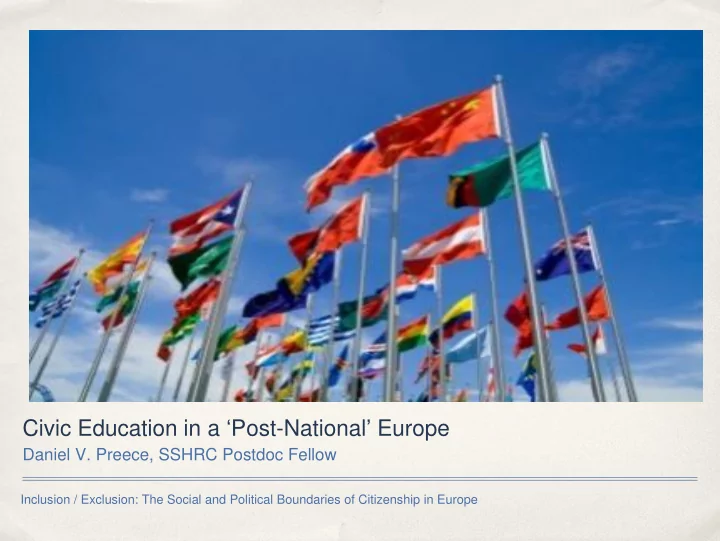

Civic Education in a ‘ Post-National ’ Europe Daniel V. Preece, SSHRC Postdoc Fellow Inclusion / Exclusion: The Social and Political Boundaries of Citizenship in Europe
Principles of Civic Education Broadly defined, the purpose of civic education is to develop the “ requisite cultural conditions for effective citizenship ” While this focus has traditionally centred on projects of nation-building and knowledge acquisition, contemporary concern has become centred on enhancing the capacity of citizens to be active participants within their society Emphasis upon participation and action implies a preference education for citizenship rather than education about citizenship “ Post-national ” approaches to civic education are principally divided between technical-economic instrumentalism and global social justice instrumentalism
Education for Future Integration Educating for Nation-Europe (1950-1970) The European Civics Campaign promoted by the Council of Europe positioned individuals as citizens of their “own country … but also of Europe and the world ” Emphasized the ethno-cultural ties between European citizens Educating for the development of European identity (1970-1992) Emphasized developing affective ties between the citizens and the institutions of Europe ( and to the exclusion of a global dimension) Policy documents provide vague references to “ promote and organise … educational activities with a European content”
Educating European Citizens, 1992-present Two key developments shaped the third phase: Formal citizenship through the Treaty on European Union The democratization of Eastern European Increasingly rights-based approach to civic education Rights are presented in a multifaceted way that are granted by European and international frameworks as well as nation-states Citizenship is now depicted as post-national — the link between citizenship and state borders, national cultures, or ethnic markers are now decoupled A greater emphasis is placed on the citizen as a member of the political community of Europe (as opposed ethno-cultural ties)
Implications for Civic Education Delinking civic education (and citizenship) to nation-states exacerbates a belief in the hollowing out of the state Curricular emphasis on globalization (over-) emphasizes global/ macro-regional constraints on national policy Leads to cognitive disengagement from political behaviour European initiatives, such as the Tuning Process (2002), promotes a technical-economic model of civic education through the focus on employment and mobility related skills Dovetails with the promotion of life-long learning Centers civic education on equipping “ employers and their employees with the skills needed for a global economy ”
Recommend
More recommend